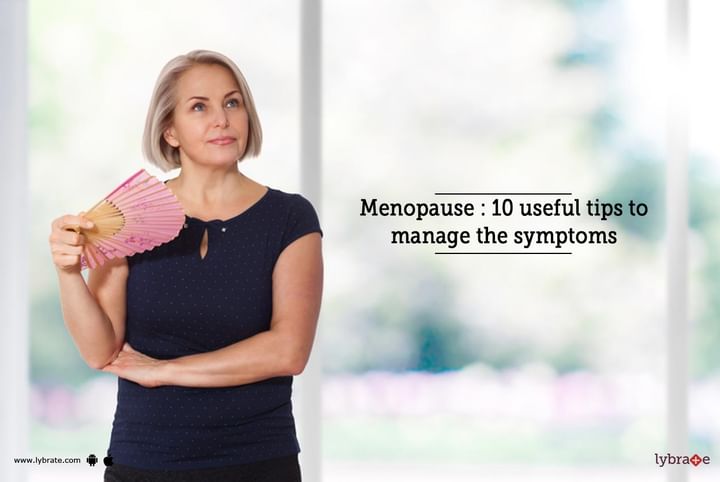Menopause: 10 Useful Tips To Manage The Symptoms
Menopause is defined as stoppage of woman's menstrual cycles because of age or removal of ovaries or uterus ( in few cases). This generally happens between the ages of 45-55 ( mostly recorded at the age of 51). This lasts for a few years before the bleeding during the menstruation completely stops. When a woman doesn't have period for a full year (twelve months) then you can say that she has reached her full menopause.
Some women can experience perimenopause first before reaching full menopause. In this the woman may experience certain changes like hormonal changes, irregular periods and other symptoms which prepares for the menopause. This is not experienced by all the women and it can start in a woman as early as ten years before menopause. So you can expect that menopause can start earlier or later than the usual range.
Menopause is considered as an important time in a woman's life. During this period a woman needs to focus on herself and her health. You need to understand this fact that this is not an illness but a major transition phase with so many symptoms. During menopause a woman must follow several steps to deal with the symptoms for protection of her own health ( as there are some risks associated with menopause which you may face).
There are few symptoms which you may observe and experience when menopause is starting and few of them are listed below:
-
Hot flashes
-
Night sweats
-
Irregular or missed periods
-
Periods are lighter or heavier than usual
-
Trouble in sleeping
-
Redness on the face (flushing)
-
Dryness in the vaginal area
-
Trouble in controlling urine (incontinence)
-
Hair thinning
-
Memory spotty
-
Mood swings (irritating mood)
-
Growth of hair on the face and body (more than usual)
-
Mass of breast starts to reduce
-
Joint pain and headaches
-
Drying of eyes, mouth or skin
When you start experiencing these symptoms, first you need to consider the age range for menopause and second you must know the age at which other woman's of you family went through menopause, then consult your doctor. If you feel that you are having these symptoms very early then get yourself examined for underactive thyroid (symptoms are same as that of menopause).
Managing menopausal symptoms: In accordance with your doctor you can have medical treatments for the symptoms. Few possible options are hormone therapy or antidepressants.
When your symptoms are not extreme or you want to have a non-medical approach first, then you can take a look at these natural methods for managing your symptoms:
-
Staying hydrated:
This is very important to stay hydrated, that is drinking water throughout the day when you are working. Drinking water is a way that minimises menopausal symptoms. Drinking water will help you get rid of feelings like dryness of skin and bloating caused during menopause. These are said to be side effects of low levels of estrogen.
-
Eliminate coffee usage:
Minimize or avoid the consumption of caffeine. Caffeine leads to exacerbation of menopausal symptoms. You can have green tea for yourself to have a pick-me-up in the mornings instead of coffee. Green tea is considered to be made up of antioxidants and has less concentration of caffeine than coffee.
-
Yoga:
If you were not in practice of doing yoga I would advise you to start doing yoga as soon as possible. This will make you feel relaxed and calm. If you will feel relaxed then you will surely be able to work properly and with full concentration. Apart from doing yoga, you should also practice deep breathing and meditation. This will make you feel calm which makes it easy for you to get through these symptoms and reduces the severity of the symptoms. Deep breathing is a great method which makes us feel relieved during hot flashes.
-
Dressing pattern:
You should dress in a way in which the symptoms doesn't bother you enough. Everyone has different work outfit to wear (dress code). You can avoid feeling overheated just by wearing the dress appropriately for your work properly. Few suggestions that you can take for dressing up can be, you can avoid wearing thick blazers, woolen sweaters and woolen clothes. Start wearing clothes which keep you cool. If it is cold outside there you can wear clothes in layers so that you can remove a few of them when you are at work.
-
Talk to someone:
You would like to keep this to yourself. You will not be sharing this that you're going through your menopause, but if you talk to someone about this you will feel relaxed and burden-free. Talking to a sympathetic person or your partner he will surely help you move past this, motivate you and help you relieve the pressure of hiding your symptoms.
-
Self-care:
If you are not feeling great or right to go to work, then it is your decision to not go to work. If you are exhausted and you were awake all night because of the hot flashes or you are not just feeling like yourself, just take a day off (sick day). After all this is a major physical change of your life and you need some time to adjust with the condition.
-
Urination:
This is not at all advised to hold your urine for a long period by any means. Menopause will surely make you go to the bathroom more frequent than regular times. So, if you want to use the washroom, you should go. You should keep your health and safety before anything else.
-
Excercise and supplements:
You should do the Kegel excercise, this makes your pelvic floor muscles stronger. This will strengthen you to fight against menopausal symptoms like urge incontinence. While sitting idle you can easily practice these Kegels which will help you so much. Before, going outside you can take supplements which will help you with these problems. Supplements such as black cohosh, evening primrose oil and probiotics have proved to be very helpful for so many women to deal with the symptoms of menopause.
-
Control the temperature:
You should adjust your space to help the body with the temperature. Keep low temperatures around yourself, for easy on and off blankets make it layered and cold packs are to be kept in the freezer. These things will help you manage the hot flashes efficiently.
-
Avoid trigger foods:
Some food items which are spicy and acidic cause night sweats or hot flashes and acidic food items (citrus like items) cause irritation in the bladder lining which worsens the incontinence. So you should avoid eating food which are spicy and acidic.
Conclusion:
You will find these points very helpful in dealing with symptoms of menopause. Menopause is a huge change and you become very sensitive, apart from these things you need some emotional support too. Before following any of this you should be aware of your allergies and see it doesn't clash with any of your ongoing medications. Consult with your doctor before starting any of the aids.



+1.svg)
